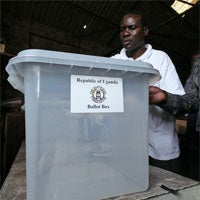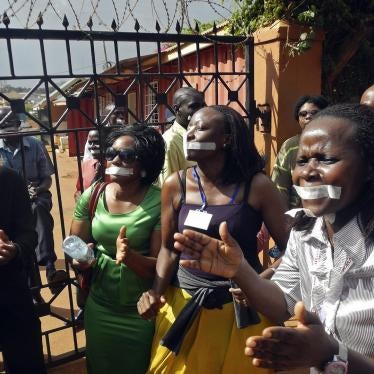The first multiparty elections in Uganda for two decades are unlikely to be free and fair because of the government’s ongoing harassment of the political opposition, Human Rights Watch said today.
Despite impressive displays of independence from the Electoral Commission and the judiciary, the first multiparty elections in two decades have been marred by intimidation of the opposition, military interference in the courts and bias in campaign funding and media coverage, Human Rights Watch said in a briefing paper released today. The briefing paper is based on research conducted over the past three months across the country and in the capital, Kampala.
“The ruling party under President Yoweri Museveni is playing a dirty game of intimidating the electorate and undermining the opposition,” said Jemera Rone, East Africa coordinator for Human Rights Watch. “The illegal involvement of the army in the campaign scares the electorate, while the opposition has its hands tied by politically motivated criminal charges against its leaders.”

The previous presidential elections in 1996 and 2001, which re-elected President Museveni, were characterized by violence and electoral malpractice, mostly by the ruling party and the security forces. The military continues to throw a shadow over the 2006 elections. The Electoral Offences Squad is investigating both the government and the opposition parties for abuses, though accusations against the opposition are less serious. Since his return to Uganda from exile in South Africa in October, Dr. Kizza Besigye, the main presidential challenger, has faced criminal charges in both civil and military courts for treason, rape and terrorism. The Constitutional Court ruled that he and his civilian co-defendants could not be tried for terrorism in military courts, but the military is insisting it has the right to try civilians on similar grounds. Civilian and military prosecutors allege that while in exile, Besigye led an effort to create a rebel movement to topple the Museveni government.
In some parts of northern Uganda, where an insurgency has terrorized and displaced almost two million people, Human Rights Watch heard reports of army officers threatening to withdraw government troops if the ruling party does not win, and leave residents at the mercy of the insurgents. The briefing paper also documents the intimidation and assault of opposition supporters and independent candidates by the ruling party, as well as harassment by security forces. These are the self-same security forces being recruited to supplement the police in supervising polling stations. The ruling National Resistance Movement-Organization (NRM-O) came to power through an armed struggle led by President Museveni two decades ago. It created a new army and a political party, called a “movement,” and ruled a de facto single party state until last year, when it accepted a return to multiparty democracy while at the same time engineering the lifting of presidential term limits. The NRM-O party can still rely on government funds, giving it a substantial advantage over its rivals.
“The Ugandan elections are in effect a multi-party contest in a single party state,” said Rone. “When the ruling party has unhindered access to government funds, illegally uses government assets such as vehicles to campaign, and receives six times as much TV coverage as the opposition, there is no level playing field.”
Human Rights Watch said that opposition candidates have often found it almost impossible to campaign via state-controlled television and have somewhat better opportunities via radio. While Besigye was turned away from several radio stations or had his broadcasts cancelled, President Museveni, as a candidate, has never been turned away. State-owned television meanwhile has devoted six times more airtime to the incumbent president’s party than to all the opposition parties put together. The paper says there are still problems with registration and access to polling stations. After controversy over voter registration in 2001, a reformed Electoral Commission introduced photo-recognition software for 2006 to prevent a voter from registering more than once. However, with the limited time-frame since the elections were called and lack of technical capacity, they are only able to apply the software in “hotspots.” Voters who were initially told they needed a registration card with photo attached have now been told they can vote without such a card. Poor voter education, insecurity – particularly in the north of the country – and unaddressed confusion over use of voter registration cards threaten access and turnout at polling stations.
“In Hope and Fear: Uganda’s Presidential and Parliamentary Polls” is available at: https://www.hrw.org/backgrounder/africa/uganda0206/





